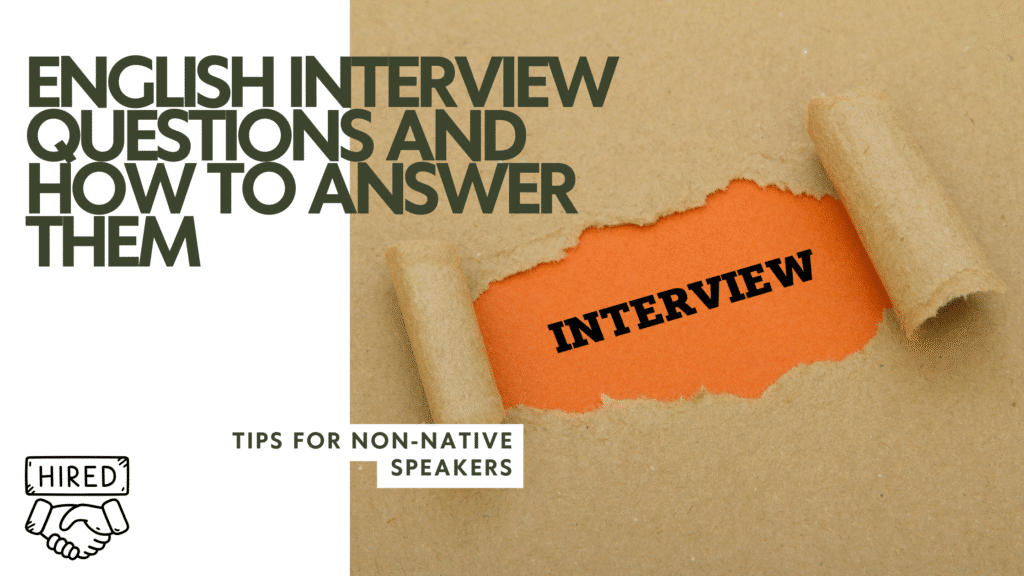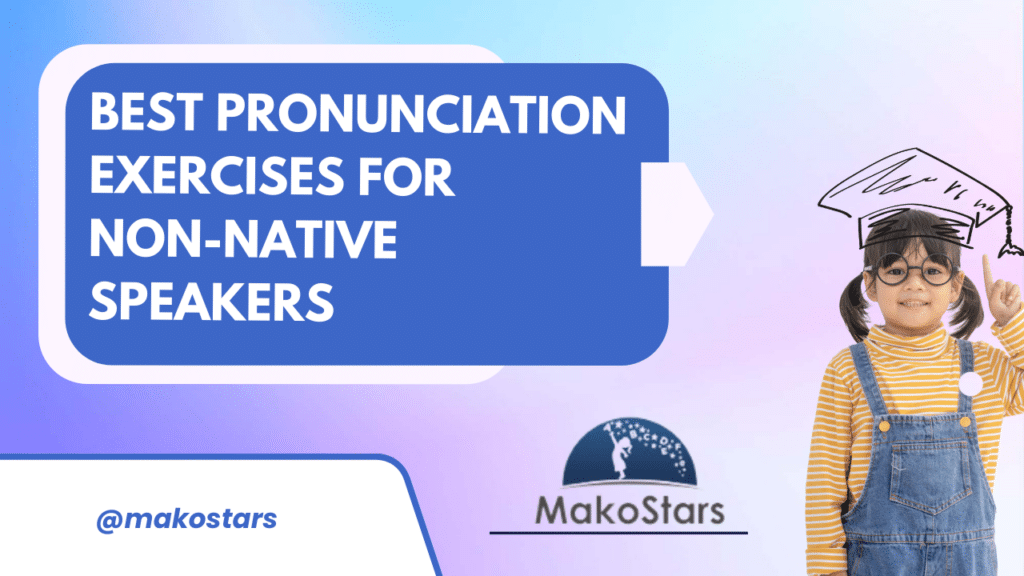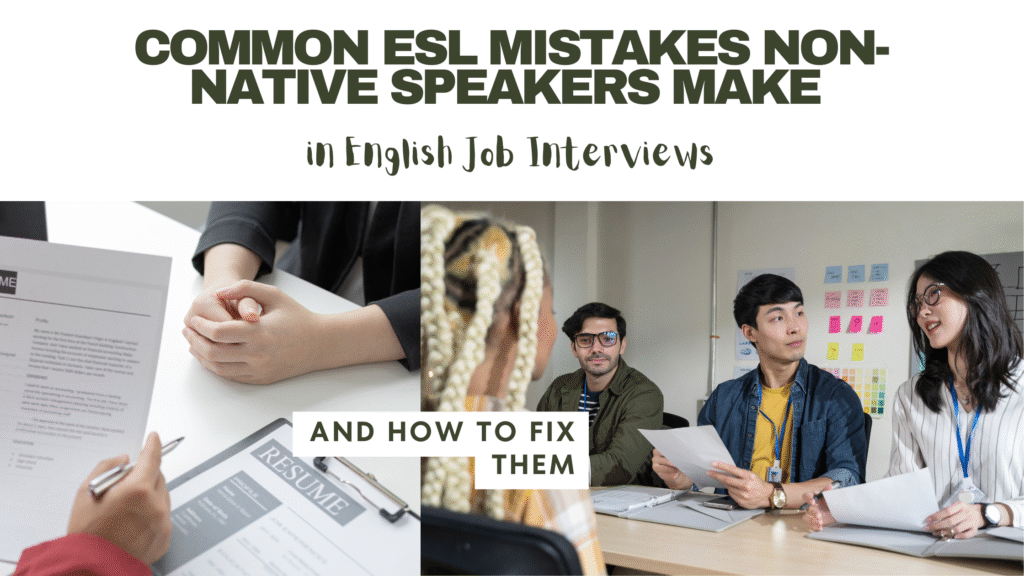Your dream job might slip away because of common ESL mistakes. Many non-native English speakers turn their interviews into stressful verbal exams by rushing their answers.
Language barriers make job interviews tough enough. Your chances of success can take a hit if you skip asking questions during or after the main interview or hesitate to admit what you don’t know.
On top of that, you can fix these common interview mistakes with the right preparation—like practicing English interview questions and how to answer them.

ESL mistakes in English interviews go beyond basic vocabulary and grammar problems. These subtle communication errors leave interviewers confused and create needless misunderstandings.
This piece shows you the common ESL mistakes and communication errors that often catch non-native speakers off guard during job interviews. Understanding these traps will give you the tools to showcase your qualifications and leave a strong positive impression.
Grammar Mistakes in Interviews
Grammar mistakes can instantly damage your credibility in job interviews. Most interviewers understand that non-native speakers might make occasional errors. Yet consistent grammatical mistakes signal communication issues that employers can’t ignore.
Grammar Mistakes in Interviews: Explanation
Non-native English speakers often make grammar errors during interviews. This happens because of first-language interference, stress, and gaps in language learning. These mistakes go beyond simple slips and can change how employers see your competence.
Job interviews need a higher standard of language precision than casual conversations. Your correct grammar shows attention to detail and communication skills that employers value highly in the workplace. Employers look at your grammar as a window into your professional abilities.
Studies reveal that employers look for strong written and oral communication skills.
Here’s some good news – you can spot and fix most common ESL grammar mistakes because they follow predictable patterns with proper preparation.
Grammar Mistakes in Interviews: Common example
These grammar errors show up often in interview settings and can hurt your professional image:
Verb Tense Confusion
❌ Incorrect: I didn’t saw the report
✅ Correct: I didn’t see the report
Many non-native speakers find it hard to use the proper verb form after auxiliaries.
Pronoun Errors
❌ Incorrect: When Bob and Pete were at the convention, he used social media…
✅ Correct: When Bob and Pete were at the convention, Bob used social media… or they used social media…
Unclear pronoun references create confusion about who you mean.
Word Choice Confusion
❌ Incorrect: I would like a peice of pie
✅ Correct: I would like a piece of pie
❌ Incorrect: I don’t want to loose this opportunity
✅ Correct: I don’t want to lose this opportunity
Homonyms and near-homonyms (like lose/loose) cause ongoing problems.
Formal Language Mistakes
❌ Incorrect: Irregardless of the challenges…
✅ Correct: Regardless of the challenges…
Some non-words like “irregardless” can really hurt you in professional settings.
Apostrophe Misuse
❌ Incorrect: The computer’s are in the office
✅ Correct: The computers are in the office
Apostrophes show possession, not plurality.
Grammar Mistakes in Interviews: Correct usage
You can fix these common ESL mistakes by learning these correct forms:
| Incorrect Usage | Correct Usage | Explanation |
|---|---|---|
| “I would like a peice of pie” | “I would like a piece of pie” | Check spelling carefully for common errors |
| “I don’t want to loose money” | “I don’t want to lose money” | “Loose” means not tight; “lose” means to misplace |
| “Call Jack and I” | “Call Jack and me” | Use “me” when you’re the object of the action |
| “I feel badly for you” | “I feel bad for you” | Most people mistakenly use adverbs when adjectives are needed |
| “It’s worth to see” | “It’s worth seeing” | Use gerund (-ing) form after “worth” |
Clear communication matters more than fancy grammar. Keep your focus on matching subjects with verbs, using proper verb tenses, and making pronoun references clear. Your word choices should also keep your meaning crystal clear.
Grammar Mistakes in Interviews: Impact on interview
Grammar errors in interviews can affect you in ways beyond simple technical mistakes. They send unintended messages about your capabilities and attention to detail.
Research proves that spelling errors on resumes lead to fewer interview chances. Resumes with five spelling errors get 18.5% fewer interviews than error-free ones. This same principle applies to how you speak during interviews.
Employers might draw these negative conclusions from your grammar mistakes:
- Lack of professionalism: Grammar errors point to carelessness and poor attention to detail.
- Poor interpersonal skills: You might come across as lacking cultural knowledge and communication maturity.
- Lower conscientiousness: People often link grammar mistakes to laziness and lack of effort.
- Questionable mental abilities: Multiple errors could raise doubts about your thinking skills.
Grammar mistakes also create real problems during interviews. They can:
- Pull the interviewer’s focus away from your qualifications
- Create confusion about your experience
- Make the interviewer mentally “translate” what you say
- Hurt your credibility when discussing technical concepts
Outstanding achievements and impressive qualifications can’t always overcome poor grammar. These mistakes stand out because they’re so easy to spot.
Troy Harrison, president of SalesForce Solutions, takes a firm stance: “You will receive resumes with misspellings, grammatical errors, and other detail mistakes that indicate a lack of attention to detail on the part of the candidate. If you see these, don’t make the hire; in fact, don’t interview”.
A bright spot exists – most interviewers understand when non-native English speakers make occasional grammar mistakes. You don’t need perfect English. Just show that you’ve made a real effort to communicate clearly and professionally.
Vocabulary Misuse During Interviews
Vocabulary errors can hurt your interview performance even when your grammar is perfect. Non-native English speakers often struggle to choose the right words in stressful situations. They end up using inappropriate vocabulary that leaves interviewers confused or gives the wrong impression.
For help growing your word bank, check out How to Expand Your English: Vocabulary Building for Adults.

Vocabulary Misuse During Interviews: Explanation
Non-native speakers misuse vocabulary in three main ways: they translate directly from their native language, rely on old textbook phrases, and try too hard to use complex words. The challenge lies in mastering the right tone for job interviews – professional yet conversational.
English vocabulary creates special problems, especially with words that sound alike but mean different things. Words that are homophones, homographs, and homonyms often trip people up. To cite an instance, see how saying you “hope to allude challenges” instead of “elude challenges” completely changes your message.
The sort of thing I love about vocabulary mistakes is they often come from good intentions. Many non-native speakers try to sound more professional by using formal language that sounds unnatural in conversation. Saying “Allow me to explain my competencies” instead of “Let me explain my skills” creates an awkward moment.
Relying too much on generic buzzwords creates another problem. Hiring managers value clear examples more than empty terminology. As one expert notes, “Most people rely on buzzwords. But hiring managers want proof of value”. This preference applies in any discipline.
Vocabulary Misuse During Interviews: Common example
These typical vocabulary mistakes can hurt your interview performance:
Overused Buzzwords Without Substance
- Saying “I’m a team player” without providing specific examples
- Claiming to be “passionate about everything” which sounds insincere
- Using clichéd phrases like “I’m a perfectionist” without context
Weak Language That Undermines Confidence
- Phrases like “I guess,” “I think,” or “I hope” that signal uncertainty
- Overuse of qualifier words like “just” or “only” when describing achievements
- Saying “I’ll do anything” which makes you seem desperate rather than flexible
Inappropriate Formality Level
- Using excessively academic language (“Allow me to explain my competencies”)
- Using outdated business jargon (“Work together with cross-functional operations”)
- Using overly casual expressions in formal settings (“This job is totally awesome”)
Confused Word Pairs
- Using “weak” instead of “week” despite different meanings
- Confusing “lose” and “loose” in phrases like “I don’t want to lose this chance”
- Mixing up “affect” and “effect” when discussing impact
Vague or Generic Vocabulary
- Using common words that fail to showcase your qualifications
- Relying on generalities instead of specific, descriptive terminology
- Missing chances to show industry knowledge through appropriate terminology
Vocabulary Misuse During Interviews: Correct usage
These approaches work better to avoid common mistakes:
| Instead of | Use | Reason |
|---|---|---|
| “I’m passionate about everything” | “I’m particularly interested in your company’s approach to [specific area]” | Shows focused enthusiasm |
| “I’m a perfectionist” | “I have high standards for my work, which helps me deliver quality results while still meeting deadlines” | Demonstrates balance |
| “I guess I could handle that project” | “I’m confident I can successfully manage that project” | Projects certainty |
| “I just managed a small team” | “I successfully managed a team that achieved [specific result]” | Removes minimizing language |
| “I’ll do anything” | “I’m eager to contribute my skills in [specific areas] while also growing in new directions” | Shows focused flexibility |
Your interview prep should focus on striking a professional yet conversational tone. Common business English phrases work better than outdated or academic language. Listen to sample interviews or ask native speakers about your phrasing to get the tone right.
Regular reading, vocabulary apps, and professional communication courses can help expand your vocabulary. Mock interviews give you practice using industry terms naturally.
Vocabulary Misuse During Interviews: Impact on interview
Poor vocabulary choice leads to several problems:
- Credibility Damage: Wrong word choices make interviewers doubt your professional judgment and communication skills.
- Impression Management Failure: Recruiters spend nowhere near 10 seconds looking at your resume before making initial judgments. They make similar quick decisions during interviews based on your vocabulary.
- Missed Opportunities: Limited vocabulary might stop you from showing your true qualifications, and you’ll miss chances to impress interviewers.
- Confidence Undermining: Struggling with words often visibly reduces your confidence, creating a negative cycle during the interview.
- Confusion Creation: Wrong words confuse interviewers who must mentally “decode” your meaning, creating extra work for them.
Poor vocabulary can shift the interviewer’s focus from your qualifications to your communication problems. They might spend time figuring out what you meant instead of evaluating your skills and experience.
The good news? Choosing meaningful vocabulary not only makes your message clearer but also boosts your interview confidence. Specific and descriptive words paint a better picture of your qualifications and help interviewers understand your true value.
Remember, you don’t need perfect English – you need to communicate effectively about your professional abilities. Practice can turn vocabulary from a weakness into a strength that shows your attention to detail and communication skills.
Pronunciation Errors That Confuse Interviewers

Your pronunciation can give you away as a non-native speaker in job interviews. This could undermine your qualifications before you finish answering the first question. Research shows listeners can spot non-native pronunciation in under one second.
Pronunciation Errors That Confuse Interviewers: Explanation
The differences between your native language and English create pronunciation challenges. These differences lead to predictable errors that affect how interviewers understand your communication abilities.
Your language background creates specific pronunciation hurdles. Native speakers of languages with fewer vowel sounds than English’s 20 often find subtle differences challenging. Many languages also lack certain consonant sounds common in English, such as the voiced and unvoiced “th” sounds.
English pronunciation requires you to master word stress, intonation patterns, and connected speech.
For extra practice, try these best pronunciation exercises for non-native speakers.
Research shows these common pronunciation issues:
- Sound distinctions get neutralized when they don’t exist in your native language
- Familiar sounds replace unfamiliar ones
- Difficult sounds get skipped
- Wrong syllable stress changes word meaning
- Words blend together incorrectly in natural conversation
Pronunciation Errors That Confuse Interviewers: Common example
Interviewers often get confused by these pronunciation errors:
TH Sound Confusion The voiced TH // (in “then,” “other,” “they”) and voiceless TH // (in “north”) create problems for non-native speakers. Many languages lack these sounds, so speakers substitute similar sounds from their native language.
Word Stress Mistakes The wrong syllable emphasis changes word meaning. “CONtent” means subject matter, while “conTENT” shows satisfaction.
Similar Vowel Confusion Short and long vowel differences like “ship” versus “sheep” lead to misunderstandings.
Final Consonants and Endings The “-ing” ending trips up many non-native speakers. They say “waitingg” instead of “waiting”. Some drop final consonants or make “bad” sound like “bat.”
Flapped T’s and D’s American English uses quick taps for T’s and D’s between vowels, not full stops.
Pronunciation Errors That Confuse Interviewers: Correct usage
You can improve your pronunciation through these approaches:
- Understand mouth positioning – Learn the right tongue, lip, and mouth movements. The ‘AA’ sound needs a dropped jaw with your tongue tip touching your bottom front teeth’s back.
- Focus on problematic sounds – Practice the sounds you find difficult. List challenging words and repeat them while listening to correct pronunciations.
- Master syllable stress – Learn which syllable gets emphasis in longer words. Wrong stress can change meaning.
- Listen extensively – Surround yourself with English audio from films, podcasts, and interviews that match your target pronunciation style.
- Record and compare – Record yourself saying tough words and compare with native speakers to spot differences.
Pronunciation Errors That Confuse Interviewers: Impact on interview
Bad pronunciation makes interviewers work harder to understand you. This extra effort can:
- Take attention away from your qualifications
- Make longer interviews tiring and frustrating
- Create confusion about your abilities
- Make you seem less professional
Pronunciation affects confidence. Students say stammering or lisping English words hurts their confidence and makes expressing ideas harder.
Teachers see this connection too. Unclear pronunciation damages students’ confidence and fluency. This creates a cycle where pronunciation issues lower confidence, which makes communication worse.
The worst outcome? Complete communication breakdown where interviewers miss key points about your qualifications.
Incorrect Use of Formal Language
Non-native English speakers face a unique challenge in job interviews when they try to find the right level of formality. Grammar or vocabulary mistakes might be obvious right away, but using the wrong level of formality can leave subtle yet lasting negative impressions.

Incorrect Use of Formal Language: Explanation
Language formality shows how polite, direct, and appropriate your word choices are in specific social contexts. Job interviews need a balanced approach – neither too casual nor overly formal language works well.
Formal language uses complete sentences, professional vocabulary, and a polished tone. Informal language has contractions, colloquialisms, and a more relaxed style. Language experts point out that formal written English is quite different from formal spoken English, which confuses many non-native speakers.
Cultural differences play a big role in language formality expectations worldwide. A language instructor notes, “In business, Italian people tend to be TOO FORMAL (certainly when speaking to someone from Britain or the States)”. On the flip side, “People in business in English-speaking countries are generally more informal and relaxed with people they don’t know”.
This cultural gap creates a tricky situation. Non-native speakers often use too much formality because they think it shows professionalism. Native English speakers, however, try to be informal quickly to build rapport.
Incorrect Use of Formal Language: Common example
Common formality mistakes include:
Too Formal:
- Using outdated business jargon: “I shall try to optimize cross-functional synergies”
- Avoiding contractions entirely: “I cannot attend the conference because I have not received approval”
- Overly complex vocabulary: “Allow me to explain my detailed qualifications”
Too Informal:
- Excessive slang: “Yeah, that job was totally awesome”
- Casual greetings: “Hey dude” or “What’s up?” to the interviewer
- Colloquial phrases: “I wanna work for your company” or “That’s gonna be great”
Words like “wanna,” “gotta,” and “kinda” cause problems in professional settings. A language expert explains, “using [these words] will give a less professional impression than if you use the correct words”.
Incorrect Use of Formal Language: Correct usage
You should match your formality level to the interviewer and company culture. A career advisor suggests, “If he’s saying, ‘yeah, dude’ you can be slightly more formal with just a ‘yes.’ On the other hand, at an interview with a former military officer… saying, ‘yes, sir’… won’t feel too formal”.
| Context | Too Informal | Too Formal | Appropriate |
|---|---|---|---|
| Greeting | “Hey there!” | “Greetings, esteemed interviewer.” | “Good morning, Ms. Johnson.” |
| Not hearing a question | “What?” | “I beg your most sincere pardon?” | “I’m sorry, could you repeat that?” |
| Describing experience | “I was the boss of five people” | “I possessed supervisory authority over a quintet of subordinates” | “I managed a team of five people” |
Note that spoken English interviews allow contractions (I’d, I’m, it’s) and sound more natural than avoiding them. Phrases like “I’ve got” instead of the more formal “I have” work well in interview settings.
Incorrect Use of Formal Language: Impact on interview
Wrong formality levels send unintended signals about your cultural awareness and social intelligence. Poor formality choices can:
- Make interactions awkward and prevent rapport building
- Show a lack of cultural understanding about business norms
- Take attention away from your qualifications and experience
- Make you seem either pretentious (too formal) or unprofessional (too informal)
Business communication experts say the right formality balance affects hiring decisions because “the reason for spending valuable time (and money) interviewing candidates is that you can only tell so much from someone’s CV: you need to meet them face-to-face and find out what they’re really like”.
In the end, formality mistakes can stop interviewers from seeing your true capabilities and personality. Interviewers want to know not just your skills but if you’ll fit the company culture. Using appropriate language formality shows you understand unwritten social rules—a valuable skill in any workplace.
Misunderstanding Interview Questions
Non-native English speakers face a basic challenge – they don’t always grasp interview questions correctly. This leads to responses that miss the point completely. Perfect grammar and vocabulary won’t help if you don’t understand what the interviewer asks.
Misunderstanding Interview Questions: Explanation
Take the question “tell me about yourself” – the interviewer doesn’t want your life story. They want to know if you’ll fit the job based on your experience and skills.
Nervousness makes it harder to listen well and can make you rush your answers. The quickest way to stay on track is to spot keywords in questions. Let’s say someone asks “What were your responsibilities in your previous role?” – focus on “responsibilities” and “previous role” to shape your answer.
Misunderstanding Interview Questions: Common example
Here’s what usually goes wrong in interviews:
Behavioral Questions Confusion
- Asked: “Tell me about a time you faced a challenge.”
- Misunderstood: Candidate talks about challenges in general instead of sharing a specific story.
Hypothetical Questions Misinterpretation
- Asked: “How would you handle an ethical dilemma at work?”
- Misunderstood: Candidate discusses ethics broadly instead of explaining their decision process.
Cultural Context Misreading
- Asked: “What’s your greatest weakness?”
- Misunderstood: Candidate lists several major flaws instead of showing an area they’re improving.

Misunderstanding Interview Questions: Correct usage
These techniques help with unclear questions:
- Ask for clarification politely: Say “Could you rephrase that, please?” or “I’d like to confirm I understand the question” – it shows honesty and professionalism.
- Employ the STAR method for behavioral questions:
- Situation: Describe the context
- Task: Explain your responsibility
- Action: Detail steps you took
- Result: Share the outcome
- Repeat back your understanding: “If I understand correctly, you’re asking about…” lets the interviewer correct or confirm.
| Instead of Saying | Say This Instead |
|---|---|
| “What?” | “I’m sorry, could you repeat that?” |
| “I don’t get it.” | “Could you clarify what you mean by [specific term]?” |
| Nodding and pretending to understand | “I want to make sure I address your question correctly. Are you asking about…?” |
Get Ahead
Job seekers who understand common ESL mistakes in interviews gain a substantial edge in their career path. This piece identifies five critical areas that challenge non-native English speakers: grammar errors, vocabulary misuse, pronunciation issues, formality missteps, and question misinterpretations.
Note that these mistakes aren’t permanent roadblocks – they’re chances to grow.
The task becomes manageable by breaking it into smaller practice sessions. Start with simple grammar fixes like subject-verb agreement and proper verb tenses. Next, build your professional vocabulary without relying on buzzwords. Your language background might make certain sounds tricky, so practice those specific pronunciations.
Recording yourself answering typical questions helps assess your formality level against workplace communication standards. You’ll also need strategies to ask for clarification if a question isn’t clear.
Of course, your technical skills and experience carry weight in job interviews. All the same, knowing how to communicate them clearly makes the real difference. Focused practice in these five key areas will boost your interview success chances and showcase the communication skills employers value most.



